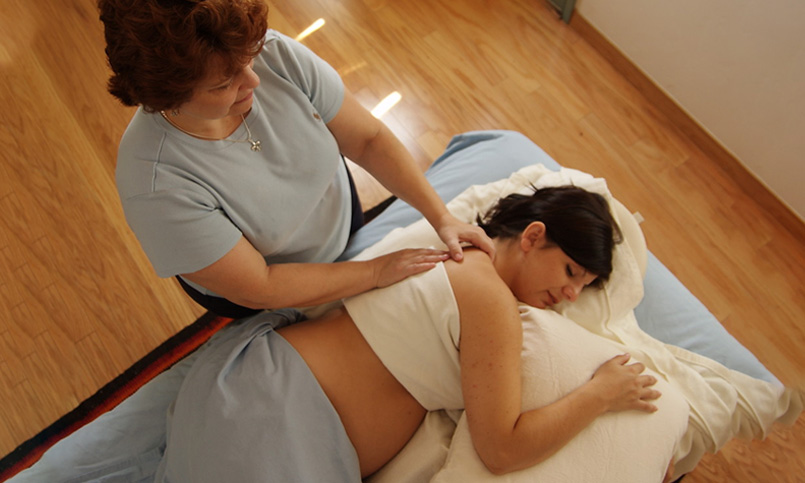When your pregnany begins, it feels like beautiful but on the other hand, it is challenging as well. As your body changes to nurture new life, you might experience aches, pains, and stress. That’s where prenatal massage comes in. Let’s explore this gentle, supportive therapy that can help make your pregnancy journey more comfortable.
What is a Prenatal Massage?
A prenatal massage is a special type of massage designed for pregnant women. It’s like a regular massage, but with some important changes to keep mom and baby safe and comfy.
Think of it as a gentle, caring touch that helps your changing body feel better. The massage therapist uses soft strokes to ease muscle tension and help you relax. They’ll pay extra attention to areas that often get sore during pregnancy, like your lower back, hips, and legs.

Key features of Prenatal Massage
- Gentle techniques
- Special positioning for comfort and safety
- Focus on pregnancy-related discomforts
- Avoid certain pressure points
Prenatal Massage Therapy: A Tailored Approach
Prenatal massage therapy isn’t just a one-size-fits-all treatment. It’s a carefully planned approach that changes as your pregnancy progresses.
Early Pregnancy (First Trimester)
During the first few months, the focus is often on:
- Easing nausea and headaches
- Helping you adjust to body changes
- Reducing stress and anxiety
Mid-Pregnancy (Second Trimester)
As your belly grows, the massage might target:
- Back pain relief
- Leg cramp reduction
- Improved sleep quality
Late Pregnancy (Third Trimester)
In the final stretch, prenatal massage can help with:
- Easing hip and pelvic discomfort
- Reducing swelling in feet and ankles
- Preparing your body for labor
Remember, every pregnancy is unique. A good prenatal massage therapist will talk with you about your needs and adjust the treatment accordingly.


Finding the Best Prenatal Massage
Looking for the best prenatal massage? Here are some tips to help you find a great therapist:
1. Check credentials: Make sure the therapist is certified in prenatal massage.
2. Ask about experience: How long have they been working with pregnant women?
3. Discuss techniques: A good therapist will explain how they’ll adapt the massage for your stage of pregnancy.
4. Consider comfort: Look for a place that has special pregnancy pillows or tables with cutouts for your growing belly.
5. Read reviews: What do other moms-to-be say about their experience?
Prenatal Massage During Pregnancy: Trimester by Trimester
Let’s break down how prenatal massage can help you throughout your pregnancy journey.
First Trimester (Weeks 1-13)
- Helps with early pregnancy fatigue
- Can ease morning sickness for some women
- Reduces stress and anxiety about the new pregnancy
Second Trimester (Weeks 14-26)
- Eases back pain as your posture changes
- Helps with sciatic nerve pain
- Improves sleep quality
Third Trimester (Weeks 27-40)
- Reduces swelling in legs and feet
- Eases hip and pelvic discomfort
- Can help position baby for birth (with your doctor’s okay)
Remember, always check with your healthcare provider before starting prenatal massage, especially if you have a high-risk pregnancy.
Prenatal Massage Benefits: More Than Just Relaxation
Prenatal massage isn’t just about feeling good (though that’s a big plus!). It can offer real health benefits for you and your baby.
Physical Benefits:
- Pain relief: Eases back pain, hip pain, and headaches
- Better sleep: Helps you relax and get more restful sleep
- Reduced swelling: Can help with puffy ankles and feet
- Improved circulation: Helps blood flow to you and baby
Emotional Benefits:
- Stress reduction: Lowers stress hormones like cortisol
- Mood boost: Increases feel-good hormones like serotonin
- Bonding time: A chance to connect with your changing body and baby
Labor and Delivery Benefits:
- Prepare for birth: Can help position baby for easier delivery
- Shorter labor: Some studies suggest regular massage might shorten labor time
- Pain management: Teaches relaxation techniques useful during labor
Remember, while these benefits are great, prenatal massage isn’t a replacement for regular prenatal care. Always keep up with your doctor visits!
Conclusion: Embracing the Journey with Prenatal Massage
Pregnancy is a time of big changes, both exciting and challenging. Prenatal massage can be a wonderful tool to help you navigate this special time with more ease and comfort.
By incorporating prenatal massage into your pregnancy care routine, you’re not just treating yourself – you’re creating a calmer, more comfortable environment for your growing baby too.
Pregnancy is a journey, and prenatal massage can be a soothing companion along the way. Whether you’re dealing with aches and pains, stress, or just want a gentle way to connect with your changing body, consider giving prenatal massage a try. Your body (and your baby) might thank you!
Also Read: Second Trimester of Pregnancy
FAQs
1. Is prenatal massage safe?
Yes, when done by a trained professional, prenatal massage is generally safe for most pregnant women. However, always check with your doctor first, especially if you have a high-risk pregnancy.
2. When should I start prenatal massage?
Many women start in the second trimester, after morning sickness has passed. Some begin earlier, while others wait until later in pregnancy when aches and pains increase.
3. How often should I get a prenatal massage?
It depends on your needs and budget. Some women go weekly, others monthly. Talk to your therapist and doctor about what’s best for you.
4. Can prenatal massage induce labor?
While massage alone won’t start labor, some techniques used late in pregnancy might help prepare your body. Ensure to consult with your doctor always.
5. What should I wear for a prenatal massage?
Wear comfortable, loose clothing. Many women stay partially dressed, while others prefer to undress to their comfort level and use draping sheets.

